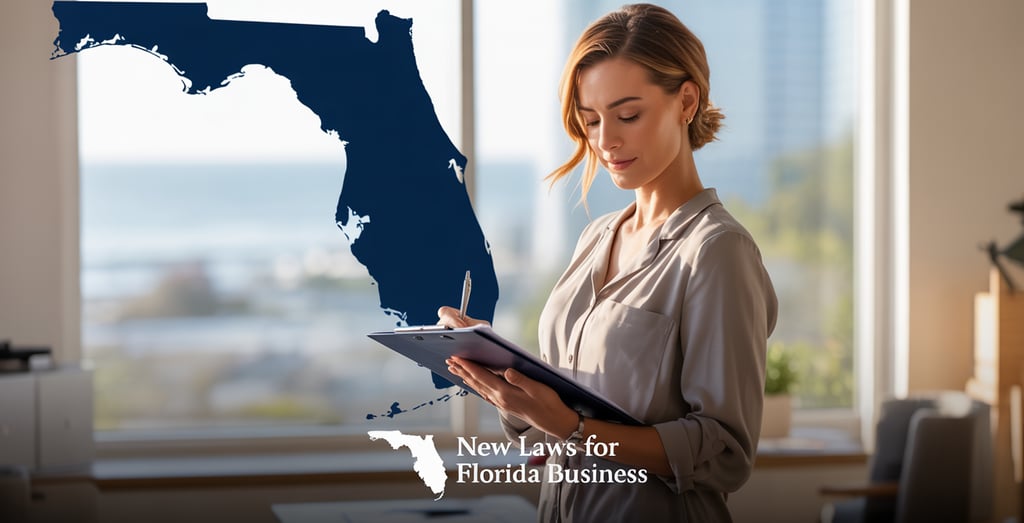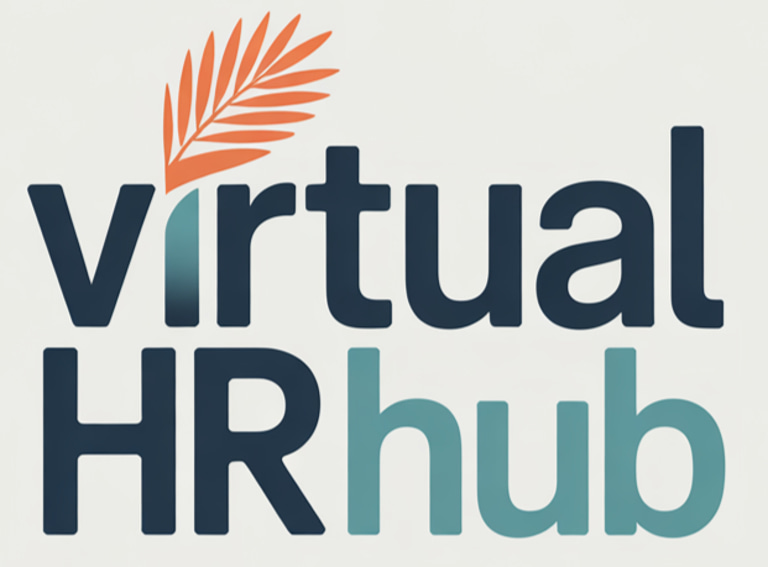Hr Compliance Checklist
Florida HR laws, fines, and 2026 updates for Orlando & all FL small businesses. Know the rules, avoid penalties, and stay compliant with ease.
HRLAWSFLORIDA
Jeremy Golan
7/22/20254 min read


Florida HR Laws Every Small Business Owner Must Know for 2025–2026
Worried about costly HR fines or confusing labor laws? You’re not alone. I’m Jeremy — a SHRM-CP and CPHR-certified HR professional with years of experience helping Florida small businesses and restaurants stay compliant without stress. Running a business is hard enough without constantly worrying about changing rules. That’s why I created this straightforward guide covering the most important Florida HR laws you need to know for 2025 and 2026 — plus recent changes that still matter.
By understanding these laws now, you’ll avoid fines, protect your employees, and keep your business running smoothly.
1. Minimum Wage and Tipped Wage Increases
Florida’s minimum wage continues to increase under the 2020 constitutional amendment. Here’s what you must prepare for:
September 30, 2025: Minimum wage rises to $14.00/hr
September 30, 2026: Minimum wage rises to $15.00/hr
Tipped workers will see increases to $10.98/hr in 2025 and $11.98/hr in 2026
If your business employs hourly or tipped workers — especially in hospitality or restaurants — update your payroll and budgeting now. Failure to pay the correct wage can result in wage claims, back pay, and penalties through the Florida Department of Economic Opportunity (DEO).
2. Youth Employment Law Changes (Effective July 1, 2024)
Recent changes to youth labor laws in Florida affect minors aged 16 and 17:
Minors can now work unlimited hours, including during the school year, if you obtain proper approvals.
They must receive a 30-minute uninterrupted break every 4 hours worked.
Scheduling policies must reflect these changes, especially in industries hiring high schoolers such as restaurants and retail.
Violating these rules can result in fines and work stoppages. Ensure your scheduling software and managers are aware of these requirements.
3. Mandatory E-Verify Compliance (Started July 1, 2024)
Employers with 25 or more employees must use E-Verify to confirm all new hires are legally authorized to work in the U.S.
Noncompliance can lead to fines of $1,000 per day per violation.
This applies to all industries, including hospitality, retail, and food service.
If you haven’t implemented E-Verify yet, act quickly. I’ve helped many businesses integrate this federal system seamlessly.
4. Workers’ Compensation Medical Reimbursement (Effective January 1, 2025)
Florida updated its workers’ compensation law to require full reimbursement for all medically necessary care related to workplace injuries. This includes:
Transportation costs
Imaging and diagnostic tests
Prescriptions and durable medical equipment
This law applies only to insured work-related injuries and is particularly important for high-risk workplaces like kitchens, warehouses, and construction sites. Failure to comply can lead to increased insurance costs and legal trouble.
5. State Law Preempts Local Labor Rules (Effective July 1, 2024)
Florida passed a law preventing cities and counties from enacting local labor regulations on:
Minimum wage
Heat protections
Predictive scheduling
Statewide laws now override local ordinances, simplifying compliance for small businesses operating in multiple jurisdictions. However, keep informed — some local governments may still attempt new regulations.
6. Restaurant Fee Transparency (Effective July 1, 2026)
Restaurants must clearly disclose all fees and charges, such as:
Automatic gratuities
Delivery fees
Administrative or operations fees
Disclosures must appear on menus, receipts, websites, and mobile apps. It must be clear whether fees are mandatory or optional, and who receives the charge.
Noncompliance risks customer complaints, lawsuits, and penalties under Florida’s consumer protection laws.
7. Pending Gratuity Legislation (Under Review for 2025)
A bill currently under legislative review may ban automatic service charges for parties of six or fewer, requiring explicit customer consent before fees are added.
If passed, restaurants must revise tipping and fee policies accordingly. Stay tuned and prepare to adjust.
8. Protected Series LLCs (Effective July 1, 2026)
Florida now permits the creation of Protected Series LLCs, allowing businesses to:
Separate assets and liabilities among multiple “series” or units under one LLC
Protect assets across multiple locations or partners
This is beneficial for restaurant groups or franchise owners wanting to limit risk exposure. Consult your legal advisor to see if this structure fits your business.
9. Third-Party Delivery Platform Regulation (Effective April 4, 2024)
New laws require delivery platforms (like DoorDash, UberEats) to:
Obtain your written consent before listing your restaurant
Disclose all transaction fees clearly to consumers
Not change your menu prices without permission
This protects your brand and pricing from unfair platform practices, giving you greater control.
10. OSHA Enforcement and Penalty Updates for 2025
Federal OSHA increased penalties for workplace safety violations by about 2.6% in 2025, with fines now reaching:
Up to $16,502 per serious violation
Up to $165,515 per willful violation
OSHA targets workplaces with high injury rates, such as restaurants and warehouses. Small businesses can earn up to 20% penalty reductions by fixing hazards promptly.
Maintain up-to-date safety training, hazard communication, and personal protective equipment (PPE) to avoid costly citations.
What Happens If You Don’t Comply?
E-Verify violations: Up to $1,000 per day per violation
Wage and break violations: Back pay, fines, and potential lawsuits
OSHA violations: Fines of tens of thousands per serious or willful breach
Fee transparency failures: Consumer lawsuits and penalties under Florida law
Ignoring these laws can lead to unexpected costs, business disruption, and damage to your reputation.
Practical Steps to Stay Compliant
Update payroll systems immediately for 2025 and 2026 wage increases
Train managers on youth labor laws and mandatory breaks
Implement E-Verify if you have 25+ employees — start on day one of hiring
Review workers’ compensation policies and claims procedures
Audit your menus and websites for clear fee disclosures
Regularly review safety protocols and training per OSHA updates
Keep informed on pending laws, like gratuity changes, and prepare accordingly
Why Work With Me?
I’m Jeremy, and I understand the unique challenges Florida small business owners face — especially in hospitality. I hold SHRM-CP and CPHR certifications and have helped numerous businesses avoid fines, improve HR systems, and train teams for compliance.
I’m here to simplify HR, so you can focus on growing your business, confident you’re protected by up-to-date policies.
Ready to Get Compliant and Stay That Way?
If you want help updating policies, training your staff, or just answering your HR questions, reach out anytime. I can also provide you with detailed checklists and policy templates tailored to Florida small businesses.
Jeremy Golan, SHRM-CP, CPHR
Your trusted HR partner for Florida small businesses
Disclaimer:
I am not a lawyer. My expertise lies in HR compliance as a certified SHRM-CP professional. All contracts and services I provide are backed by professional liability insurance. For any legal advice or issues, please consult a qualified attorney.
Sources:
Florida Senate: flsenate.gov
Florida Department of Economic Opportunity: floridajobs.org
OSHA: osha.gov
Lowndes, Drosdick, Doster, Kantor & Reed P.A.: lowndes-law.com
GrayRobinson LLP: gray-robinson.com
Your total HR Solution!
We take care of the "heavy lifting" so you can soar!
Support
Certified, experienced and insured.
924 N. Magnolia Ave, Suite 202-5448
Orlando, FL 32803
© 2025. All rights reserved.
